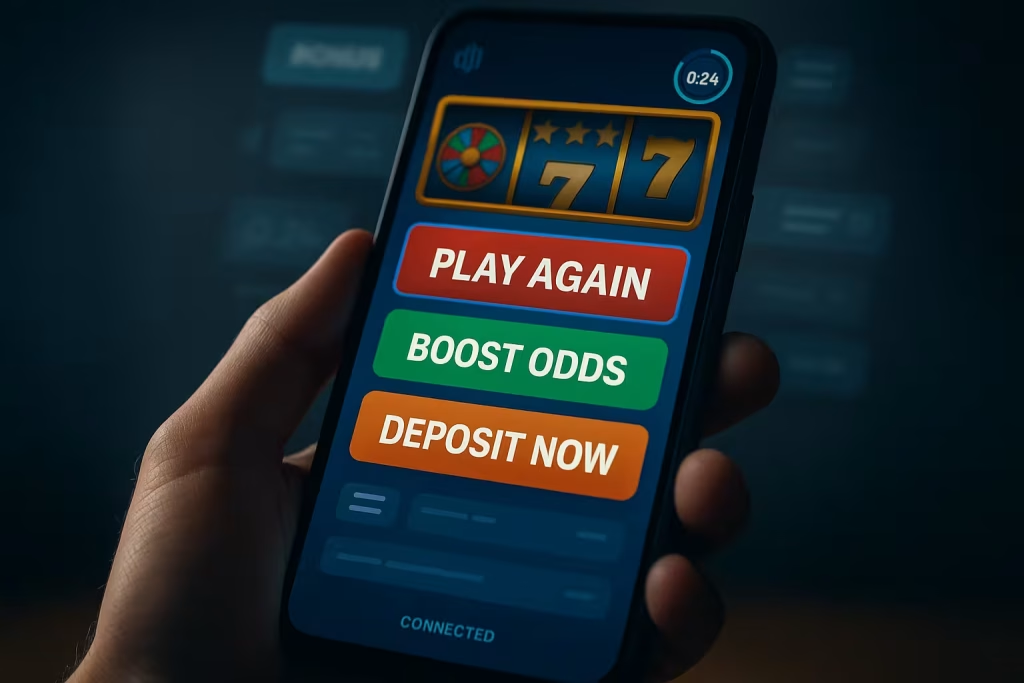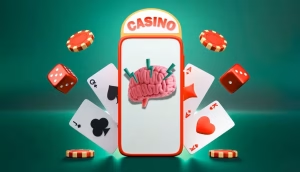Online Gambling vs. In-Person Casinos: What Makes Digital Play So Addictive?

You’ve probably noticed it yourself — it’s far easier to lose track of time when gambling online than when sitting at a blackjack table or sportsbook in person. What starts as a “quick bet before bed” can quietly stretch into hours of spinning, scrolling, and chasing one more win.
So why does online gambling feel so much more addictive? It’s not just imagination — there’s science and design behind it. Online platforms are built to be frictionless, personalized, and always available. You can deposit in seconds, bet instantly, and get results faster than your brain can process the dopamine rush.
In a physical casino, you face natural speed bumps — travel, closing hours, waiting for the next hand. Online, those barriers disappear. The result? A faster, tighter reward loop that keeps you engaged longer and betting more often.
Let’s break down why that happens — and how you can recognize the signs and take back control.
The Psychology—Why the Brain Loves “Just One More Spin”
Gambling taps into the same reward systems that drive motivation, excitement, and habit formation. Online platforms have learned to compress those triggers into rapid, repeatable experiences that make “just one more spin” feel irresistible. Every sound, animation, and near-miss is designed to keep your brain engaged, chasing the next little surge of dopamine.
Here’s what’s really happening under the hood:
Variable Rewards and Near-Miss Effects
One of the strongest drivers of addictive behavior is unpredictability. Your brain reacts more strongly to inconsistent rewards than predictable ones — the same principle that makes slot machines so powerful.
- Variable reward loops: You never know when the next win will come, which makes each spin more thrilling.
- Near-misses: Seeing two jackpot symbols line up and one just miss tricks your brain into thinking you were “close.”
- Small wins that feel big: Even when you technically lose money, colorful graphics and “congratulations” sounds still make it feel like progress.
Each of these triggers tiny dopamine bursts, reinforcing the urge to keep playing.
Time Distortion and Flow
Online gambling removes nearly every natural brake that exists in the real world. There’s no dealer to slow down the action, no physical chips to count, and no line at the cashier. That friction-free design lets you slip into what psychologists call “flow” — a state where you lose track of time and awareness of your surroundings.
- Autoplay features keep bets rolling without interruption.
- Instant results from spins and bets create nonstop stimulation.
- No closing time means the loop can run 24/7, especially on mobile.
Before you realize it, an hour can vanish — and your bankroll along with it.
Cognitive Biases Supercharged Online
Our brains are wired with built-in shortcuts, or biases, that once helped us make quick survival decisions. In gambling, those same instincts can lead us astray — especially online, where decisions happen in seconds.
Common biases that drive online gambling behavior include:
- The Gambler’s Fallacy: Believing a loss streak means a win is due.
- The Hot-Hand Fallacy: Thinking success will continue just because you’re “on a roll.”
- The Sunk-Cost Fallacy: Chasing losses because you’ve already “invested too much.”
- Availability Bias: Seeing others’ wins or trending games makes you think your own chances are better.
Each tap, spin, or click keeps these biases active — turning what started as fun into a loop of false confidence and emotional decision-making.
🧠 Key Takeaway
Online gambling intensifies your brain’s natural reward system by combining speed, unpredictability, and constant stimulation. The faster the feedback, the tighter the loop — and the harder it becomes to step away. Recognizing these patterns isn’t about guilt; it’s about awareness. Once you see how the loop works, you can break it before it breaks your balance.
Design Patterns That Tighten the Loop (UX Dark Patterns to Watch)

Online gambling platforms are designed with one clear goal — to keep you playing. The most successful ones borrow techniques from social media, gaming, and behavioral psychology to hold your attention for as long as possible. These aren’t always malicious on the surface, but they often cross into what experts call “dark patterns” — subtle design choices that nudge you to act against your best interests.
Instead of friction, online casinos and sportsbooks remove nearly every obstacle between impulse and action. Let’s look at the most common design patterns that make online gambling so sticky.
Frictionless Onboarding and Depositing
From the moment you download an app or visit a site, you’re guided through a seamless setup that minimizes pause or reflection.
- Social logins let you join in seconds — no lengthy forms or ID checks.
- Stored payment methods mean you can deposit instantly.
- Auto-fill features and bonus pop-ups encourage you to fund your account right away.
That convenience feels user-friendly, but it also bypasses the mental “are you sure?” step that usually protects your wallet.
Infinite Play Loops
Casinos and sportsbooks don’t want you to leave the experience. Every design choice is meant to keep the loop running:
- Autoplay or turbo spin eliminates downtime between wagers.
- Quick-rebet prompts appear after every result, encouraging instant action.
- “Play again” buttons are placed front and center — while “withdraw” options are often buried in menus.
Even small things, like no loading screens or instant animation resets, make quitting feel like friction while continuing feels natural.
Personalized Nudges and Dynamic Offers
Behind the scenes, algorithms track your behavior — when you play, how long you play, and what you like to bet on. The result is a stream of offers and prompts tailored just for you.
- Targeted bonuses appear when your activity dips (“Here’s a $10 free bet — don’t stop now!”).
- Win streak notifications feed the illusion of momentum.
- Loss recovery promos (“Get 20% back if you play again”) encourage chasing losses.
It’s personalization that feels rewarding but is engineered to maximize engagement.
Gamification and Progress Systems
Modern gambling sites turn betting into a game itself. You’re not just wagering — you’re earning badges, climbing levels, and unlocking “missions.”
- Tiered VIP programs reward frequency and volume, not net wins.
- Daily missions or streaks push you to log in every day.
- Limited-time boosts or multipliers add urgency, making you feel like you’ll “miss out” if you stop.
This transforms gambling from an occasional activity into a daily habit loop.
Push Notifications and Social Proof
Once you’re in, you’re never really out. Notifications and real-time feeds keep you tethered to the platform even when you’re not playing.
- Push alerts: “Your boost expires in 10 minutes!” or “Cash out before it’s too late!”
- Social proof banners: “Jessica from Ohio just won $4,500 on this slot.”
- Countdown timers: Urgency tricks your brain into quick decisions before logic kicks in.
These small cues are powerful. The average player doesn’t realize how much of their behavior is being guided by design — not by choice.
Product Mechanics: Why Sportsbooks & Online Casinos Hit Harder
The mechanics behind online gambling go beyond fun and convenience — they’re scientifically engineered to maximize engagement, speed up decisions, and deepen the dopamine loop. Whether it’s a casino app, live dealer table, or in-play sportsbook, the goal is the same: to create more betting opportunities per minute than you’d ever experience in person.
Let’s look at how that works in practice.
Speed and Frequency
In-person gambling has built-in pauses: walking to a table, buying chips, waiting for a dealer, or watching a spin. Online, those brakes are gone. Every click delivers a new outcome instantly.
- Micro-betting & rapid play: Instead of waiting for an entire game or hand, online bettors can wager on the next pitch, play, or spin — sometimes every few seconds.
- Instant results: Win or lose, you know immediately, keeping your reward system on high alert.
- No downtime: When one market closes, another opens — all on the same screen.
That speed means more emotional highs and lows in less time, which accelerates both excitement and risk.
Personalization at Scale
Online platforms use AI and behavioral data to study how you play — then tailor the experience to keep you coming back. The more you bet, the better the system understands your preferences.
- Recommended bets: Algorithms surface markets similar to your past activity.
- Customized bet builders: Suggest parlays or props based on what you usually pick.
- Time-based offers: Promotions appear when you typically play (like late-night boosts or halftime odds).
- Streak recognition: Systems identify patterns — like when you’re on a hot streak — and trigger congratulatory messages or targeted offers.
That personalization makes the platform feel like it’s built for you — which builds emotional attachment and increases frequency.
Gamification and Loyalty Loops
Gamification turns gambling into an ongoing progress system. It’s no longer about winning or losing — it’s about leveling up, earning rewards, and keeping your streak alive.
- Tiered loyalty levels: Reward consistent play, not net profit.
- XP points or streak counters: Create a sense of progression even if you’re losing money.
- Time-limited missions: “Place 5 bets in the next hour to unlock a bonus” — introducing urgency and fear of missing out (FOMO).
- Daily spin wheels or challenges: Free mini-games that draw you back daily.
These loops reframe gambling as achievement-based rather than risk-based, hiding losses behind gamified goals.
The Illusion of Control
Online gambling platforms subtly make you feel more in control than you actually are. Customizing bets, picking numbers, or building parlays gives a false sense of mastery over chance.
- Interactive bet builders mimic strategy, masking randomness.
- “Cash out early” features make players feel empowered — even though the house has already priced in its edge.
- Real-time stats and visual trackers add analytical appeal but rarely change expected outcomes.
That illusion of control keeps bettors engaged, convinced they’re outsmarting the system.
Visual & Auditory Reinforcement
Every win — big or small — triggers a sensory celebration. The brain interprets these cues as success, regardless of actual profit.
- Bright colors and flashing lights trigger excitement.
- Winning sounds and animations make even minor payouts feel rewarding.
- Subtle losses disguised as wins: For example, “You won $0.50!” after betting $1.
Over time, these cues condition your brain to associate betting with excitement, not risk — just like slot machine sound design in traditional casinos.
Payments, Credit, and the “One-Tap Redeposit” Problem
When you gamble in person, you have to physically hand over cash, walk to the cashier, and count your chips — all moments that force your brain to recognize what’s happening. Online, those friction points vanish. With stored payment methods and one-click deposits, the act of spending feels almost invisible.
This shift doesn’t just make gambling easier — it removes the natural “pause” your brain needs to make rational decisions.
Frictionless Payments Remove the “Pain of Paying”
In behavioral economics, the “pain of paying” is what keeps most people from overspending — you feel the loss when you hand over cash. Online gambling neutralizes that:
- Stored credit cards and digital wallets let you reload instantly without re-entering details.
- Autofill deposits happen faster than your brain processes the cost.
- One-click redeposit buttons keep you in action with zero friction.
You don’t feel like you’re spending money — you’re just pressing buttons. That illusion of detachment is what makes losses accumulate quietly over time.
Deposit Bonuses Anchor Larger Spending
Welcome bonuses, reload offers, and “match” promotions are intentionally structured to anchor your expectations higher.
- “Deposit $200 and get $200 free” subconsciously reframes $200 as the minimum entry point.
- “Claim a 50% boost on your next $100 deposit” triggers urgency and ups your baseline.
- Once you’ve deposited a higher amount once, your brain adjusts — smaller deposits start to feel insignificant.
These tactics are powerful because they feel generous, but they subtly normalize higher risk and faster depletion of funds.
Micro-Losses Don’t Feel Like Losses
Online platforms are masters at breaking big losses into small, painless moments. A few $10 bets here and $20 parlays there feel harmless — until you realize they’ve added up to hundreds.
- Low-minimum bets create the illusion of safety.
- Autoplay slots or in-play bets multiply frequency and volume.
- “Balance rounding” features (like betting $0.97 instead of $1) give the illusion of precision while draining every cent.
These micro-transactions are the digital equivalent of drip spending — harmless individually, but devastating collectively.
Late-Night Access Increases Emotional Spending
Traditional casinos close or at least require travel. Online, the casino is open 24/7 — and your device never sleeps. That matters more than you might think.
- Fatigue and emotion reduce impulse control late at night.
- Private environments remove social accountability — no one sees you chasing a loss.
- Instant redeposit options make “just one more try” frictionless.
This combination — isolation, emotion, and instant access — creates the perfect storm for impulsive decisions.
Invisible Credit and Overdraft Features
Some platforms or connected wallets allow credit-based deposits or delayed charges, blurring the line between your money and borrowed funds.
- You might see a “pending transaction” or “insufficient funds” warning only after playing.
- Some banks even treat gambling transactions differently, delaying how they appear on statements.
- The result: you’re spending money you haven’t emotionally processed as gone yet.
This isn’t just about convenience — it’s about control. And the less you feel each transaction, the more likely you are to keep going.
Mobile Context: Addiction in Your Pocket
The biggest shift in gambling over the past decade isn’t the apps, the odds, or the promotions — it’s that the entire casino now fits in your pocket. The same device you use to check messages, order food, or scroll social media can instantly turn into a full-fledged sportsbook or slot machine.
That convenience feels harmless at first. You’re standing in line at the grocery store, watching a game on TV, or winding down in bed — and you think, why not place a quick bet? But that’s the trap. The accessibility of mobile gambling means there’s never a natural stopping point. There’s no drive home, no closing time, no physical cashier to slow you down. Just an endless scroll of odds and games waiting for your next tap.
Mobile gambling also blends into the rhythms of everyday life. You might check your bets between meetings, during commercials, or while waiting to pick up your kids. It’s casual, private, and always available — the perfect storm for habit formation. Every notification, every app icon badge, every small win reinforces the same loop: cue → action → reward → repeat.
And because mobile devices are so personal, gambling becomes emotionally insulated. No one sees when you lose, no one watches when you chase. That privacy amplifies the behavior — you’re accountable only to the app. Combined with fatigue, stress, or boredom (the three biggest emotional triggers for risky play), that convenience turns into compulsion faster than most people realize.
The truth is simple: when the casino is always open, discipline has to become your closing time. Turning off notifications, removing gambling apps from your home screen, and setting screen-time limits can all help reintroduce friction — those small but crucial pauses that keep entertainment from turning into obsession.
Why In-Person Casinos Still Matter—And Why They’re Different

Walking into a real casino feels very different from opening an app. The lights, sounds, and crowds still work to keep you playing, but the environment itself creates natural barriers that online gambling removes. That’s what makes the in-person experience both exciting and self-limiting in ways the digital world can’t replicate.
In a physical casino, you have to go somewhere to gamble. You get dressed, plan the trip, maybe go with friends. That extra effort adds friction — and friction slows things down. Each decision to keep playing is more deliberate because it takes time and energy to act on it. Online, those steps shrink to a swipe and a click.
The social element also matters. You’re surrounded by people — dealers, servers, other players — and that visibility subtly influences behavior. Even the most committed gamblers tend to exercise more restraint when others can see how they’re playing. There’s an unspoken social pressure that keeps most people from completely losing control.
Physical casinos also have built-in stop cues that online platforms simply don’t:
- Travel time: You have to physically leave when you’re done.
- Cash handling: Paying with chips or cash forces you to feel the exchange.
- Human pace: Dealers, table rules, and other players slow the game naturally.
- Operating hours: Many casinos or sportsbooks close, forcing an end point.
These built-in limits make it harder to gamble impulsively. Even when you’re deep in a session, the act of walking away — collecting chips, waiting for valet, heading home — gives your brain time to reset and reflect.
Online gambling, in contrast, eliminates all those buffers. You can go from losing a bet to placing another in under ten seconds — no dealer, no chips, no walk to the exit. That speed removes reflection, and reflection is often the difference between controlled fun and dangerous habit.
So while in-person gambling can still be risky, it provides something online gambling doesn’t: natural rhythm and human friction. And those two things — time and awareness — are often what protect players from crossing the line between entertainment and addiction.
Red Flags: Signs Your Online Play Is Getting Risky
Most people don’t realize their gambling is becoming a problem until they’re already deep in the cycle. Online platforms make that line easy to cross because everything happens fast, privately, and often feels like “just a few dollars here and there.” But the truth is, small warning signs appear long before things spiral — you just have to know what to look for.
One of the biggest red flags is hiding or downplaying your activity. Maybe you start switching between apps or using different cards so you don’t have to see how much you’ve really spent. Or you avoid talking about it because you know deep down it’s more than you intended. When gambling becomes something you manage in secret, that’s a signal it’s starting to control you.
Another warning sign is chasing losses — telling yourself you’ll “win it back” if you just stay a little longer. That mindset turns rational play into emotional play, and it’s one of the fastest ways to drain both your bankroll and your confidence.
Here are some of the most common red flags to watch for:
- You find yourself betting longer or more often than you planned.
- You increase your wager size after losses, hoping to “get even.”
- You start playing at unusual times, like late at night or during work hours.
- You ignore other responsibilities or social plans to keep playing.
- You feel restless, anxious, or irritable when you can’t gamble.
- You justify your play by saying it’s “just for fun” even when it’s clearly not fun anymore.
Many people also experience what’s called emotional anchoring. You start linking gambling with certain moods — playing when you’re bored, stressed, lonely, or even celebrating. Over time, your brain learns to reach for the app every time those emotions surface. That’s how a habit becomes a reflex.
If any of these feel familiar, it doesn’t automatically mean you have a gambling addiction. It simply means the balance is shifting — and it’s time to take a step back, set limits, or talk to someone before it becomes harder to stop. The earlier you recognize the signs, the easier it is to reset your relationship with gambling before it starts running the show.
Practical Ways to Regain Control (Actionable & Specific)
Recognizing that your gambling might be getting out of balance isn’t weakness — it’s awareness. And awareness is the first step toward getting control back. The good news is that you don’t have to quit altogether to regain discipline. You just have to reintroduce friction, structure, and reflection — the three things online gambling quietly removes.
Here’s how to get started:
Set Limits Before You Play
Don’t wait until you’re deep into a session to think about limits — set them before you log in. Pre-commitment creates boundaries that emotion can’t override later.
- Choose a fixed bankroll that you’re willing to lose in full — think of it as entertainment money.
- Set daily or weekly deposit caps through your gambling account.
- Use built-in tools to establish time limits — for example, one hour max per day.
- Disable autoplay and quick-bet features so every wager requires a conscious choice.
Once you’ve hit a limit — stop. Not when you’re “ahead,” not when you feel “due.” Just stop.
Change the Environment
Where and when you gamble matters more than most people realize. When your surroundings signal “play,” your brain learns to associate that space with gambling. Changing the environment breaks that trigger loop.
- Move gambling off your phone’s home screen or into a hidden folder.
- Don’t gamble in bed or on the couch — only in one specific spot that feels separate from relaxation spaces.
- Use grayscale mode on your phone during certain hours — less color = less stimulation.
- Set screen-time limits or “downtime” hours on your device after 10 p.m.
You can’t rely on willpower alone — smart design beats discipline every time. So redesign your environment in your favor.
Track What You’re Doing
The more data you have about your own habits, the easier it is to control them.
- Download your betting history and calculate net results, not just wins.
- Use a bankroll tracker or journal (like our Smart Bankroll Manager) to log every session.
- Add context — time of day, mood, and emotion. Patterns will appear.
- Review your data weekly. Seeing your own stats in black and white is one of the strongest deterrents to impulsive play.
Build Accountability
You don’t need a therapist or a hotline right away (though both can help). Sometimes, just making it social breaks the isolation that fuels compulsive gambling.
- Tell a trusted friend your limits — let them check in once a week.
- Join an online community focused on responsible play instead of big wins.
- If you gamble with friends, agree on clear time limits or spending caps before you start.
- When you feel the urge to chase losses, pause and message someone before placing the next bet.
Accountability turns control into a shared effort — and makes you less likely to break your own rules.
Add Healthy Replacements
When gambling starts to fade from your daily routine, you’ll need to fill that space with something positive. Otherwise, boredom pulls you right back.
- Try short bursts of physical activity — it resets dopamine naturally.
- Pick a hobby that gives feedback (like cooking, gaming, or investing simulations).
- Schedule time with family or friends during your usual gambling windows.
- Create a nightly routine that signals the day is done — reading, journaling, prayer, etc.
Replacing the habit, not just removing it, is what makes change stick.
🔑 Key Takeaway
You don’t need to give up gambling to regain control — you just need to slow it down. Add friction where the platform removes it. Bring structure where chaos thrives. And most importantly, make every wager a choice, not a reflex.
Small, consistent changes — like setting limits, tracking data, or adjusting your environment — can transform your experience from reactive to responsible.
Platform-Level Safeguards Worth Using
Even though online gambling platforms are designed to keep you engaged, many now include built-in safety features — if you know where to find them. These tools don’t get advertised as much as bonuses or odds boosts, but they’re some of the most powerful ways to protect your bankroll and mental balance.
Think of them as guardrails, not roadblocks. They don’t stop you from enjoying the game; they just keep you from veering off the edge.
Here are the most effective safeguards every player should know about:
🕒 1. Set Reality Checks and Session Timers
Most major sportsbooks and casino apps let you enable pop-up reminders that tell you how long you’ve been playing.
- Set your first alert for 30 minutes, then another at 60.
- When that message appears, pause — don’t ignore it. Use it as a cue to log your results or step away.
- These gentle interruptions reset awareness before fatigue or emotion take over.
💰 2. Establish Deposit and Loss Limits
This is one of the simplest and most underrated tools out there. You can set a maximum daily, weekly, or monthly deposit amount, and once you hit it, the system locks you out automatically.
- Start lower than you think you need — it’s easier to raise later than lower in the heat of the moment.
- Pair deposit caps with loss limits, which stop you after a preset amount of total losses.
- If your platform doesn’t offer these, consider switching — responsible operators always do.
🚫 3. Cool-Off and Self-Exclusion Options
When you feel things getting out of control, even a short break helps your brain reset.
- Cool-off periods let you temporarily lock your account for 24 hours up to 90 days.
- Self-exclusion programs go further, blocking access for 6 months or more.
- You can usually activate these instantly from your account settings — no need to talk to support.
These features are designed to protect, not punish. The best bettors know when to use them.
🔕 4. Turn Off Push Notifications
Push alerts are one of the most powerful psychological triggers in gambling apps. “Your bonus is waiting” or “Game starting soon” can undo hours of discipline.
- Go into your device settings and disable notifications from all gambling apps.
- Unsubscribe from promotional emails and text messages.
- You’ll be amazed how much mental space you regain once those reminders disappear.
🔒 5. Block or Limit High-Risk Games
If you know certain types of gambling — like slots or same-game parlays — tend to pull you in, most platforms now let you restrict access to specific products.
- You can block entire categories (like casino games) while still betting on sports.
- Some operators let you set time-of-day restrictions too — a great option if you tend to bet late at night.
- Third-party apps like Gamban or BetBlocker can block gambling sites across all devices.
Special Case—Same-Game Parlays & Micro-Betting
Few betting features have exploded in popularity as quickly as same-game parlays (SGPs) and micro-betting. They’re fun, fast, and full of potential — or at least, that’s how they’re marketed. But under the hood, both are designed to amplify excitement and risk.
Same-game parlays give you the freedom to build multiple legs within one matchup — like a quarterback’s passing yards, a receiver’s touchdowns, and the team to win — all bundled into one bet with long odds. The promise is huge payouts for small stakes. The reality? Every added leg multiplies the house edge and decreases your true chances of winning.
Then there’s micro-betting — the real-time wagering trend that lets you bet on what happens next: the next pitch, the next play, the next free throw. It’s thrilling because it’s constant. But that speed is exactly what makes it dangerous. You can place dozens or even hundreds of bets during one game without realizing how quickly your exposure is stacking up.
Why These Formats Hit Harder
- Faster feedback loops: Wins and losses happen in seconds, feeding the brain’s reward system nonstop.
- Higher frequency: You can place far more bets in a single session, increasing volatility and emotional swings.
- Perceived skill illusion: SGPs and micro-markets make you feel analytical and strategic — but outcomes remain mostly random.
- Loss chasing: Quick losses tempt you to “double up” before the next play, creating a rapid emotional rollercoaster.
It’s not that these markets are inherently bad — they just require a different mindset. The same tools that make them exciting can make them addictive.
If you enjoy parlays or live bets, set hard caps on how many you’ll place per game. Treat them like seasoning, not the main course — a sprinkle of excitement, not your entire bankroll. And never let the “one-more-play” mentality dictate your decisions.
The Science Bit (Explainer, Plain English)
To understand why online gambling feels so hard to put down, you have to look at what’s happening inside the brain. It’s not just about willpower — it’s about biology. Gambling taps into the same neurological reward systems that drive excitement, motivation, and habit formation.
Every time you place a bet, your brain releases dopamine, the neurotransmitter associated with pleasure and anticipation. You don’t just get that rush when you win — you get it when you almost win, or even just while waiting for the result. That’s what makes gambling so different from most other activities. The excitement comes not from the outcome, but from the uncertainty.
Over time, your brain starts craving that feeling more than the reward itself. It learns to associate betting — the act of playing — with pleasure. And because online gambling delivers that stimulus faster and more frequently than any casino floor ever could, it’s incredibly efficient at reinforcing the loop.
Here’s how that feedback cycle works:
- Cue: You see a notification, an odds boost, or a trending game.
- Action: You place a bet or spin — it only takes a second.
- Reward: You get an instant result — win, lose, or near-miss.
- Repeat: Your brain releases dopamine and reinforces the behavior, even if you lost money.
Each step strengthens the habit. And the shorter the time between cue and reward, the faster the pattern forms. That’s why online gambling — with its speed, 24/7 access, and constant visual stimulation — builds habits much faster than traditional play.
As your tolerance grows, so does your need for intensity. The same small wins that once felt exciting start to feel flat, leading to larger bets or more frequent play to chase the same high. This is the same reward desensitization seen in other addictive behaviors like social media scrolling, binge eating, or substance abuse.
But here’s the important part: awareness disrupts the loop. The moment you start recognizing the cues and noticing the rush before each bet, you regain power over it. Awareness slows the automatic process down — and that’s where real control begins.
🧬 Key Takeaway
Gambling addiction isn’t about weakness — it’s about wiring. Online platforms supercharge the dopamine-reward cycle by removing delays, amplifying visuals, and increasing frequency. Understanding that your brain is reacting exactly how it’s designed to can help you stop blaming yourself — and start building healthier habits that replace the rush with real reward.
Responsible Gambling at GamblingSite.com
At GamblingSite.com, we believe gambling should always be about entertainment — never pressure, panic, or pain. The moment it stops being fun, it’s time to pause and take a closer look. That’s why we take responsible gambling seriously and provide tools, resources, and education to help every player stay in control.
We know the online gambling environment can be intense. It’s fast, it’s exciting, and it’s designed to keep you engaged. But staying in control means being proactive — setting limits, tracking play, and recognizing early warning signs before they become real problems.
Our commitment is simple: to promote safe, balanced play for everyone who visits our site. On our Responsible Gambling page, you’ll find:
- Step-by-step guides on how to set limits with online casinos and sportsbooks.
- Direct links to national and state help lines, support networks, and self-exclusion programs.
- Access to self-assessment tools that help you understand your risk level.
- Educational content explaining the psychology of gambling and practical strategies for control.
If gambling is beginning to feel more like stress than fun, you’re not alone — and you don’t have to face it alone. Help is available 24/7, confidential, and judgment-free. Visit our Responsible Gambling section for resources, or call your state’s support line for immediate help.
Remember, gambling should add to your life — not take from it. We’re here to help make sure it stays that way.
Online Gambling Is Evolving — So Should Your Boundaries
Online gambling has changed the game — literally. It’s faster, more convenient, and more personalized than ever before. But those same strengths are also what make it so addictive. The endless availability, instant feedback, and smart design of modern gambling platforms can quietly turn entertainment into dependency if you’re not intentional about setting boundaries.
That’s why awareness matters. Once you understand how these systems are built — and what they’re designed to trigger — you can approach them differently. You can slow down, add friction, and make gambling a conscious choice again.
Whether it’s setting deposit limits, tracking your play, or using tools to help you out, the key is to stay in control of the game, not the other way around.
Remember: gambling should feel fun, social, and optional — not compulsive or consuming. Play with purpose, take breaks often, and know when to walk away. The most successful gamblers aren’t the ones who play the most — they’re the ones who know when enough is enough.

Alyssa contributes sportsbook/online casino reviews, but she also stays on top of any industry news, precisely that of the sports betting market. She’s been an avid sports bettor for many years and has experienced success in growing her bankroll by striking when the iron was hot. In particular, she loves betting on football and basketball at the professional and college levels.







